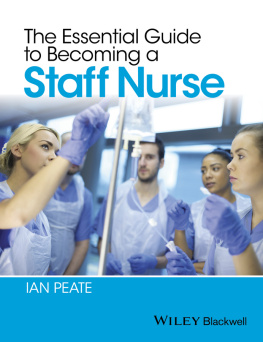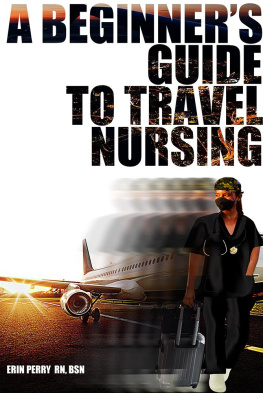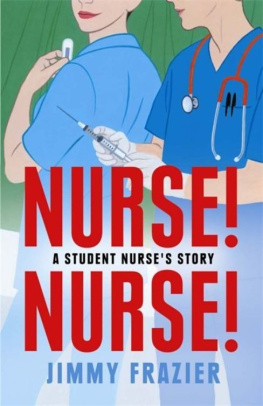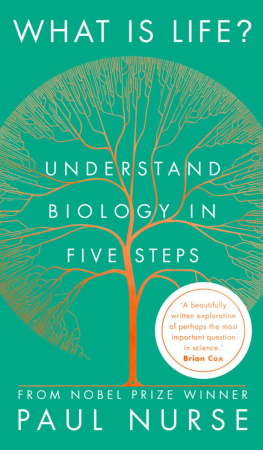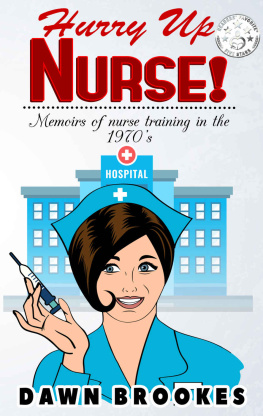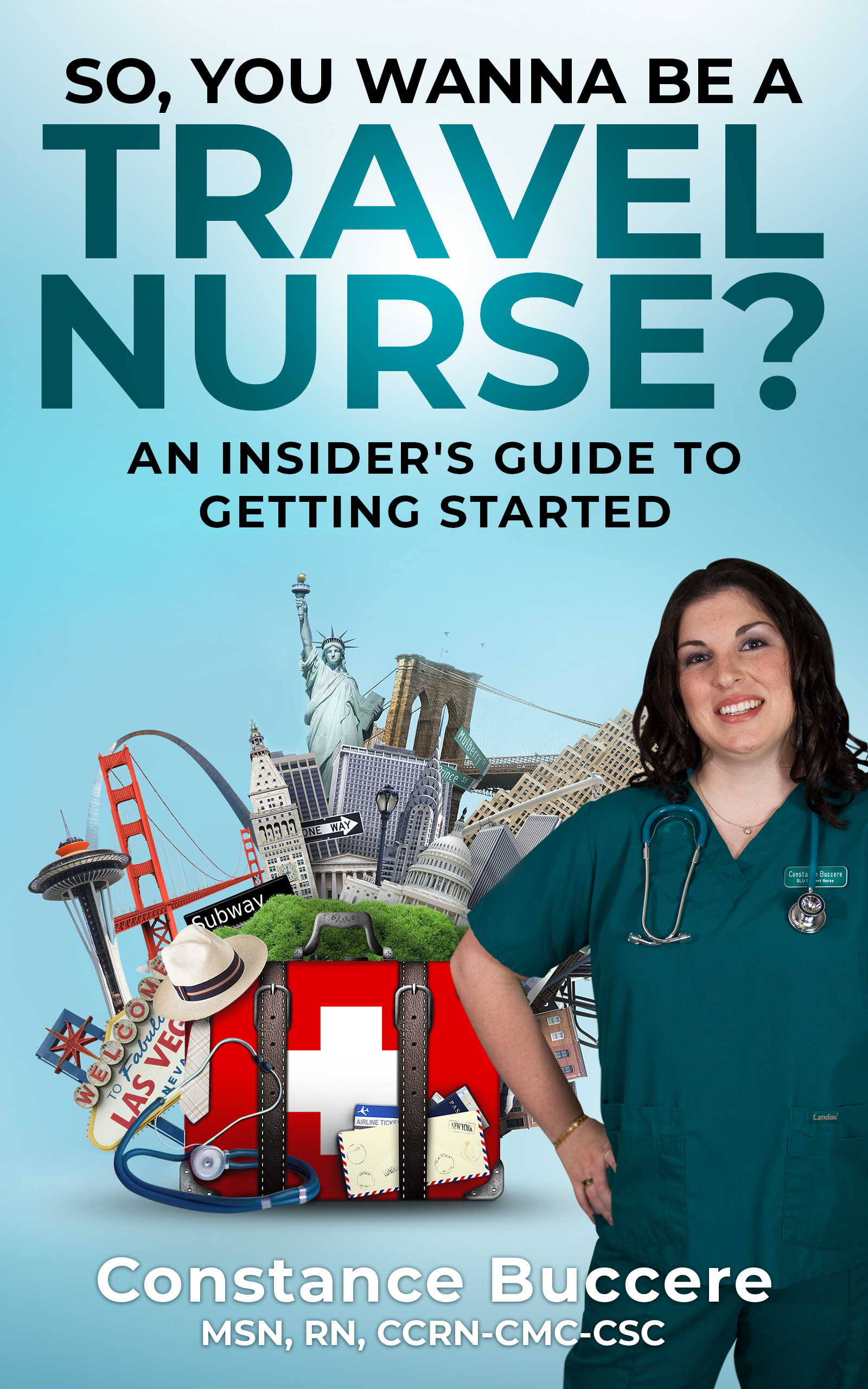Copyright 2021 Constance Buccere
All rights reserved. No part of this book may be reproduced, stored in a retrieval system, or transmitted in any form or by any means, electronic, mechanical, photocopying, recording, scanning, or otherwise without permission from the copyright owner.
The author has made every effort to provide accurate Internet addresses and information compatible with standards accepted at the time of publication. However, the author is not responsible for errors, omissions, changes, or any outcomes related to using this books contents and takes no responsibility for using the products or procedures described.
Library of Congress Control Number: 2021902124
Cover Design Dionisio C. Manalo, Jr.
Photos of Author Joey Michel Photography
Contents
for Brenda
Thank you for setting this in motion years ago, when you gave me the idea to write a book about my travel nursing journey.
Preface
W hen Im asked, How long have you been traveling? my answer, ten years, since I started this journey in fall of 2011. But the truth is, I started travel nursing four years earlier in the summer of 2007 during my undergraduate nursing program, when I did a study abroad program in Honduras. I spent two weeks learning and providing nursing care with a team of eight American nursing students in undergraduate or graduate school, several Honduran nursing students, and three Honduras-based physicians in Tegucigalpa, Talanga, Guiamaca, and Roatn. I learned a lot about myself, the areas I needed to work on, as a student nurse before transitioning into a practicing registered nurse (RN), and that travel was coded in my DNA.
I spent the first few years of my career bouncing from specialty to specialty, feeling restless and unfulfilled. I love what I do, but at the time I just didnt feel challenged, leading me to take a job as a neuroscience outcomes analyst at the hospital where I was working. I completed research that was later turned into Hardwiring Best Practice Stroke Care, a presentation about implementing the American Stroke Associations guidelines for emergency and inpatient stroke care, but this wasnt cutting it either. I was still feeling restless. Then one day in the spring of 2011, the lightbulb started shining bright during a conversation with a colleague. I was talking about looking for another position because I was bored. She pointed out that I changed jobs every few months and that wouldnt look good on a rsum for the future. As she held that mirror up, reflecting my behavior, I thought back to a travel nurse I met during my first job as a RN. She talked about 13-week contracts, moving all over the country for work, and taking a month off every year. As the conversation about my behavior ended, I realized I was a travel nurse, just in one hospital. And that was the beginning of a career that has given me more than I could have ever imagined. I dont think I ever thanked my colleague for that, but Im grateful, even though I wasnt at the time.
After a few years as a travel nurse, I would get asked about getting started in the industry by staff nurse colleagues. I would give them the agency and hospital interview questions and some of the guidance in this book to help them. As this pattern repeated, several nurses said I should write a book about getting started in travel nursing. This would trigger the memory of the first time I heard I should write a book about travel nursing that came from my therapist in late 2012. I remember thinking this woman is crazy, but truthfully, she was just the first to see what the nurses telling me to write a book also saw. The more I heard this, the more I started to believe that I could and should write about what I knew. Finally, in September 2019, the planets aligned, and everything clicked.
While I continued to work 36-hour a week travel contracts, I would write bits of this book between enjoying the attractions and fun of my assignments destinations. While working an assignment in California, the coronavirus pandemic hit, shutting down everything, leaving me with nowhere to go and nothing to do except work. My contract for CVICU was transitioned to COVID ICU because heart surgeries were canceled, except for emergencies. Working in a COVID ICU before we knew the basics of the virus and how to treat it took a mental and emotional toll. I saw more death in three months than I had in the previous 12 years of being a nurse. The only mental stress relief working for me was being outside, walking and biking through the neighborhood. Then came the wildfires from an August thunderstorm, forcing me to be inside, creating the perfect storm for a breakdown.
After my breakdown or coming-to-terms with life, as my best friend referred to it, I focused my energy on this book, which only took three to four months to get on the page so my editors could make it the best for you, dear reader. Thank you for your time and dime; I hope this book gives you the foundation for starting a great career in travel nursing, however long you plan to do it, and dont forget Enjoy the journey .
INTRODUCTION
Is Travel Nursing Right for You?
A re you independent? Do you like to challenge yourself personally and professionally? Do you have an adventurous spirit or a touch of wanderlust? Are you up for an adventure that allows you to meet new people and experience new places and cultures in a way that you cant with a traditional vacation? Can you quickly adapt? Are you able to handle changing environments every few months? If you answered no to any of these questions, put the book down now. Close the cover of your tablet, e-reader, or laptop. Set your alarm to go into your staff job tomorrow. Dont waste your time. However, if youre like every travel nurse that emphatically answered YES! then welcome to the next exciting chapter in your career. My hope is that this book will fully prepare you to enter the wonderful, crazy world of travel nursing that I have called home for almost ten years.
As Im sure youve gathered from the previous questions, travel nursing is not for every nurse. It requires a specific set of traits to turn a nursing career into a travel nursing career. You will need to use every trait that makes you a great nurse, but the most common ones that Ive found necessary to make the leap to travel nursing include fortitude, independence, resourcefulness, confidence, flexibility, and open-mindedness.
These characteristics are the foundation of the ideal traveler. These traits link arms like Dorothy, the Tin Man, the Scarecrow, and the Cowardly Lion, and skip down the yellow brick road together to every travel assignment. Youll quickly realize how essential they are: youll be drawing on them from the moment you decide you want to try travel nursing until you finish your last contract, regardless of whether its a one-contract experiment to rid yourself of debt, or a long-term lifestyle choice like mine. Therefore, its worth assessing whether you possess these qualities already, or whether you might need to work on them.
According to Merriam-Webster, fortitude is strength of mind that enables a person to encounter danger or bear pain or adversity with courage. Most nurses refer to it as backbone, determination, or guts. Regardless of what you call it, you must have it in abundance. It takes a backbone of steel to leave the safety of familiarityyour family, friends, home, and workand move hundreds, or even thousands, of miles away. You will be moving into a new apartment, finding your way in a new place, and starting a new job, mostly on your own. To brave such a situation, you will have to call upon every ounce of courage you possess. You might not be on your own for every assignment. But, if you plan to travel for any amount of time, you will eventually run into this situation, especially if you are on your own (which represents the majority of travelers). However, some nurses travel with their spouses, fiancs/fiances, girl/boyfriends, family members, or even pets. That kind of support can be helpful, but it doesnt alleviate all the stress of starting a new travel assignment.



